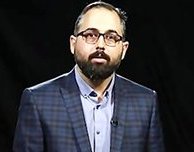 Dr. Ahmad Shakernejad said, “The Coronavirus has created a deep earthquake at the level of our identity, disintegrated our minds and caused a rift.”
Dr. Ahmad Shakernejad said, “The Coronavirus has created a deep earthquake at the level of our identity, disintegrated our minds and caused a rift.” RNA – Speaking in an online conference entitled “The Future of Spirituality and the Islamic Seminaries in the Post-Coronavirus World" held by Rasa News Agency. Dr. Ahmad Shakernejad, a member of the faculty of the Research Institute of Ethics and Spirituality at the Institute of Islamic Sciences and Culture, said, “Spirituality is taken seriously in all crises, including floods and earthquakes, but the challenge of the Coronavirus, which has emerged as a global pandemic, has become a public issue.”
The teacher at al-Mustafa International University stated that the discussion and question of spirituality has become a question among everyone and said, “Human beings have four basic fears that have been with us since the creation of human beings and human societies – death, illness, old age and oppression. In the contemporary world, other fears have been added including: hidden loneliness, environmental crises and the pace of change.”
Dr. Shakernejad added, “Modern man suffers from the weakness and rootlessness of communication and in his secrecy, he faces a deep loneliness. Another concern in the modern world is the environmental crisis, which didn’t exist in the past, and the third fear is the speed of change and transformation that we have never seen in history and today, historians aren’t idle for a moment and they have to record the cases at any moment.”
He said, “The Coronavirus has created a deep earthquake at the level of our identity, disintegrated our minds and caused a rift. Peter L. Berger [Austrian-born American sociologist and Protestant theologian] discusses how we try to transform existing anomalies into order with our own epistemological systems, including the discussion of the sacred canopy.”
He noted, “According to this view, by using traditional religions and modern achievements, we can delineate a sacred canopy and quickly get out of confusion, and this is very sensitive for modern man, because the speed of change is high.”
In other remarks, Dr. Shakernejad said, “Until two weeks ago, people were thinking about what to do during the holy month of Ramadan. The people used to say that if the pilgrimages and congregational prayers are suspended, will the month of Ramadan also be suspended? It was interesting to me who should answer these questions and, in this regard, the Academy of Medical Sciences made a statement and presented a way for the people, while in this way, no voice was heard from the seminaries.”
Rasa News Agency
112/978